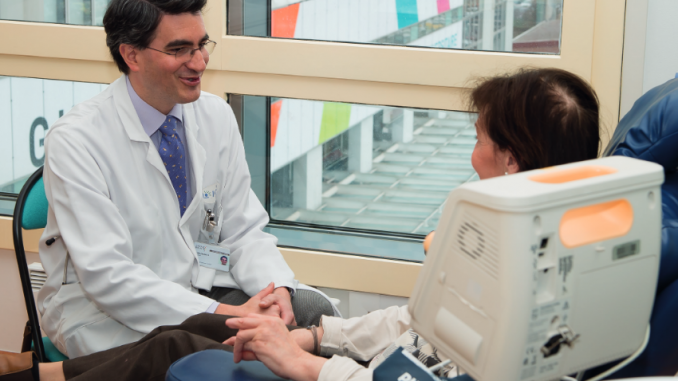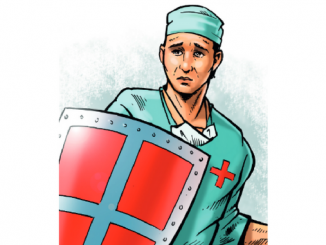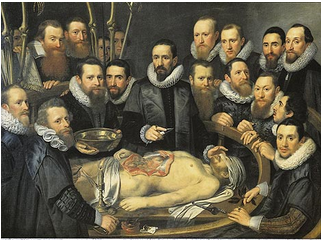
Phase I trials now play an essential role in treating patients with metastatic cancer, offering vital extra moves in the battle to outplay the disease, says Jean-Charles Soria. He warns, however, that not every patient wants to play every move, at any cost. Getting that bit right is where the real challenge lies
In 2002, when Jean-Charles Soria was at the beginning of his career in medical oncology, he met a bishop who made a surprising assertion. Soria remembers the words: “Jean-Charles,he said, I wouldn’t like to be you on the day of judgement. You have received so many gifts that the judgement is going to be very harsh.”
The words have stayed with Soria, a practising Catholic. It wasn’t good enough to shine at a clinical oncology conference, or get papers published in prestigious journals, or sit back and enjoy the perks of being a high flyer. His gifts were there to maximise for the good of others.
So he has all the hallmarks of a young man in a hurry. At the age of 42 he was installed this January as Editor in Chief of Europe’s prestigious cancer journal, the Annals of Oncology. In 2006 he became France’s youngest full professor when he was appointed Professor of Medicine and Medical Oncology at South Paris University aged 35. A member of the committee of the American Society for Clinical Oncology since 2006 he has contributed over 350 papers to peer reviewed publications including two original publications, as senior author, in the New England Journal of Medicine.
He is considered, he says, “a prototype for the new wave of oncologists carrying out precision medicine focused on the molecular architecture of the tumour” – particularly known for his cutting-edge work in phase I trials, and new models of treatment in lung cancer.
And yet that is not enough. When we meet at his office at the Gustave Roussy Cancer Centre, Paris, where he is full-time cancer specialist and Chair of the Drug Development Department (DITEP), Jean-Charles Soria hurries through the state of the art medicine. The impressive career history is mere background. What he really wants to talk about, and what he wants to become a major focus of his work, is something altogether more simple but also more challenging: addressing the real needs of patients.
It isn’t that he has lost interest in the potential of new targeted therapies and new molecular knowledge of tumours. On the contrary, they are at the heart of the dilemma.
“Today, our greatest challenge is not to sacrifice humanity to technology,” he says. “The risk is greater than ever before because of the power of biotechnologies and bioinformatics. Today, we know a lot about a patient’s disease and are extremely well trained at identifying targets, at using new technologies to image and molecularly decipher the tumour, to provide a more sophisticated and individualised approach. But we all get so excited by the science and forget that we are treating a patient with a history, his own challenges, a projection of life that varies very greatly from one to another. It’s not easy for doctors to talk about failure and death, and we also find it hard to understand that what may be traumatising bad news for one patient – for example hair loss – may not be bad news for others.
“I am asking oncologists not only to be good clinicians, with a robust biological background, but also to be good empathetic and open human beings. And it’s not easy.”
The dilemma, says Soria, is that precision medicine is changing everything in oncology but medical oncologists are not keeping up with the implications. They fall back on outdated assumptions, scales and training. What needs changing in particular is the assumption that “efficiency” equates to delaying tumour progression – whatever the human cost.
A priority now is to have more of an eye on those costs, whether they be patient anxieties or poorly understood drug toxicities. For example, Soria believes it is time to start using a new language when assessing drug toxicities in phase I trials, because molecular target agents bring new kinds of side effects – often chronic, such as diarrhoea – which are simply not accounted for in old scales established to measure the acute toxicity of cytotoxic compounds. What is currently categorised as “mild” toxicity might be intolerable to a patient over a long period. Soria is looking at the issue as part of the EORTC New Drug Advisory Committee’s task force on phase I methodology.
“I’m not asking for oncologists to be some sort of Robocop, efficient but empathetic, trained in bioinformatics and molecular biology, nice to everyone. There are very few of those people and it’s impossible to do everything. But I am saying that we must deal with the challenge of how, as a community, we can simultaneously push the frontiers of better biotechnological approaches, better informatic approaches, better drug development approaches, better evaluation of toxicity, while keeping track of a patient at the centre of it all who has their own, possibly tragic, story.”
Soria has himself played more than a minor part in changing the cancer game: he speaks of his passion for refining targets and treatment with precision medicine. Born in La Paz, Bolivia, to a Bolivian mother (a bilingual secretary) and a French father (an engineer), Soria studied medicine at the Paris Medical School, winning the silver medal for best student in 1997. Between 1999 and 2001 he took a postdoctoral fellowship at the M D Anderson Cancer Center in Houston, Texas, then gained a PhD at South Paris University in the fundamental basis of oncogenesis in 2001, before starting work as Assistant and Associate Professor of Medicine and Medical Oncology at Gustave Roussy. As head of the hospital’s phase I trials unit since 2006, his work has focused on identifying new pharmacodynamic biomarkers to predict disease progression and treatment effectiveness, and early clinical development of targeted therapies for solid tumours.
His thoracic cancer research team has contributed to major advances in the field of molecular medicine, including the role of proteins such as ERCC1 and MSH2 in DNA repair and their use as predictive markers for resistance to chemotherapy in lung cancer. The group is using this knowledge to sensitise tumours to chemotherapy and targeted therapies.
Soria also led research into a new engineered monoclonal antibody with very low toxicity, MPDL3280A for non-small-cell lung cancer, which he described at the European Cancer Congress in September last year as a “game changer” in the field of immunotherapy. Finally, he says, it looks as if immunotherapy will fulfill all its early potential.
What particularly excites Soria, and you can see his glee as he describes it, is that because molecular technologies can be targeted at the patients who will benefit from them most, and because toxicities are increasingly well-controlled, the entire trials process has been transformed. No longer are phase I drug trials an option of last resort for those who are dying. His own early clinical trials unit, where so many of these new developments have been tested, is bringing immediate hope of a longer good-quality life to the majority of patients.
“Today, I think there is a complete misunderstanding in the oncology community about what phase I trials are, or how much they have changed in the past decade. They used to be the step before palliative care. They involved between 40 and 100 people at two or three centres, testing a new compound to define tolerability or toxicity. Today, it’s completely different. Most of the time a phase I trial also offers a new therapeutic option with intrinsic activity: this has been true for imatinib, vemurafenib, crizotinib, and the new PD1/PDL1 immune checkpoints. Phase I is no longer for a small group of people who are ready to die and are willing to be exposed for toxicity. It is hundreds of patients who will have a response to a therapeutic compound. It is multicentre, it is about activity rather than toxicity. In fact in some cases phase I has almost entirely swallowed up phase II.”
A recent analysis of patient data from main phase I centres across Europe, published in the Journal of Clinical Oncology (2012, 30:996– 1004) found that today half of all patients benefit from their participation, with a risk of death from toxic side-effects lower than that associated with receiving adjuvant chemotherapy. “Today, what we are offering in phase I is as good as any third-line treatment, and you can quote me on that.”
Soria acknowledges that in some countries phase I trials are even more crucial to access innovative efficacious drugs. This is notably the case in the UK, for example, because of the drug rationing imposed by the National Institute for Health and Clinical Excellence. In France, the transformation of early trials has been hastened by the recognition of seven comprehensive cancer centres (sites de recherche intégrée sur le cancer, or SIRIC), 16 phase I centres designated by the national cancer institute, INCa (of which the Gustave Roussy is the largest and most active), and the implementation of molecular tumour profiling for personalising treatment at 28 regional centres.
It is the future. And its importance is being shamefully neglected by some academic institutions, believes Soria. “People need to understand that phase I is absolutely mandatory for any academic medicine centre that wants to push precision medicine,” he says. “When you tell a patient, come and see me, we will analyse the molecular structure of your tumour – and then you have no action to take as a result of that analysis, you are selling them a mirage. If you are an academic centre which cannot do molecular profiling, or cannot offer a large palette of new compounds, you will never do precision medicine, you will never do personalised medicine, you are just blah blah.”
That is why the centres that have aggressive precision medicine initiatives are the same centres pushing early drug development, and why the phase I unit in Gustave Roussy, which conducts 57 phase I trials at a time, has become an Integrated Drug Development Department. Its wards currently accommodate 370 patients, but by 2015 it will be able to provide beds for more than 500 patients in phase I trials.
“Today it is clear to me that the survival of a metastatic cancer patient is entangled with their capacity to participate in clinical research, and notably early clinical trials,” he says.
Yet many cancer specialists still believe that clinical research is optional, and separate from standard care. It appalls him. “Clinical research always gives you more options,” he says. “We’re playing a game of chess with death. We need to anticipate moves, and research gives you extra moves.” One way forward is to build more bridges between clinicians and basic researchers. He is a supporter of the model put forward by Stephen Friend of SAGE Bionetworks, a non-profit organisation providing tools to conduct collaborative biomedical research, where medical doctors and PhDs are paired up over three years so that they can learn from each other.
“We’re playing a game of chess with death. We need to anticipate moves, and research gives you extra moves”
Soria talks in passionate terms about the lifesaving mission of oncologists, the need for them to do patients the honour of being open and helping patients to be open. It is partly borne of his experiences talking to patients – several times, he refers to patients with cancer being suicidal and the inability of doctors to spot or deal with this. He talks fondly of a patient who told him that she wanted to leave some money to his department, but no she didn’t want to leave it to research: “I don’t care about mice,” she had said, “I care about that stupid doctor who told me I had sciatica when infact I had a bone met. I want to donate it to training better doctors.”
But it is also a result of his family history. When Soria was 13 his sister received a diagnosis of leukaemia at the age of seven – the family moved from Bolivia to Paris in 1984 so that she could receive treatment there.
It was successful, and she is still alive today. But it has impressed deeply on him the waves of impact cancer can have not only on an individual but on a family. “It has created a sense in me that this is a discipline where the stakes are high,” he says. “So there is a huge need for specialists with passion and commitment. I am convinced that if we don’t deal appropriately with the human being and his or her own challenges, then we’re going to miss out on delivering optimally to the patient.”
To achieve this, oncologists will have to meet many challenges. How do you identify those patients who would benefit more from talking about the prospect of death or other anxieties than talking about the size of their tumour? How do you find time for such conversations? How do you provide oncologists with the tools to have difficult conversations? How do you teach empathy?
Implementing methodologies for breaking bad news, such as the American SPIKES six-step protocol, is only part of the solution. Oncologists need training so that they recognise that open communication with patients is at least one third of their job, and so that they don’t participate in the “magical thinking” that if you talk about the end, you’re going to precipitate the end.
Training is the key, says Soria. He remembers being confronted with his own failings when an external consultant visited his department to provide guidance on talking to patients. Like all doctors, his oncologists had sometimes been faced with patients angry that they had been kept waiting a long time. And sometimes, oncologists would feel a sense of injustice at this, especially if they had made special attempts to fit a patient into a busy schedule. “But we forget that for these patients, who are already under great stress because of their disease, the consultant’s door is like a door into space – it can bring you to beautiful countryside, or your infancy, or a terrible place. So it is unacceptable that we should try and logically justify why we are late. As the consultant told us, there is only one answer: I am deeply sorry. We do not realise we are saying the wrong things.”
Such areas, Soria has resolved, will be a focus for his efforts now. He acknowledges that he has always felt an inner pressure to deliver, and in the past his efforts have been “diffuse”. “
My wife recently said to me: ‘You have written 350 papers, when are you going to stop? This is insanity.’ So now my priorities are to develop an intelligent approach to drug development, push precision medicine initiatives in lung cancer, develop molecular and clinical predictors of drug efficacy and toxicity, and to put new efforts into training fellows and assistant professors on breaking bad news.”
One other focus will be the Annals of Oncology, the flagship journal of the European Society for Medical Oncology. Soria has a bond with both ESMO and its journal. He was a member of the ESMO Executive Board between 2008 and 2009, and his first English peer-reviewed original manuscript was published in Annals in 1997. When he was appointed Editor in Chief in September last year, Soria put on record his determination to raise the “impact factor” of the journal – a measure reflecting the number of citations to articles published in the journal and used as a proxy for the relative importance of the journal in its field. He also wants to increase the number of high-quality reviews and guidelines and attract more randomised trials including negative ones. “We will solicit articles on cutting-edge topics such as precision medicine and novel immunomodulatory agents, reflecting the new paradigm in oncology,” he says.
When I put to him recent criticisms of journals’ obsession with impact factor – Nobel Prize winning biologist Randy Schekman has described it as a “toxic” influence because it encourages the publication of articles that are eye-catching rather than good science – Soria is pragmatic. “The flaws and limitations of the impact factor are known to many people, and I’m in line with those criticisms,” he says. “I know it can be completely linked to four or five good papers and all the rest can be average. But you can’t pretend that impact factor isn’t there. I am going to be judged, and impact factor is something measurable that’s very clearly defined by the outside world. We need to define goals, and at least I’m totally transparent about my aims.”
Soria is aware that as a high-flyer, he needs pulling firmly down to earth sometimes. In this respect, his family – in whom Soria continually says he is “blessed” – have clearly had an important role. He remembers his wife, Isabel, a paediatrician who he married 16 years ago, greeting his excited announcement that he had had a paper accepted by the New England Journal of Medicine with the words: “Good, now change your boy’s diaper.”
Her attitude was right, says Soria. “I used to go home from work thinking, right, I’ve done my 14 hours, now it’s time to enjoy. But Isabel said no, it’s time to have kids, forget you exist, raise the kids and make them better human beings.” He got more than he bargained for. “I imagined that my maximum tolerated dose was two children, but we had four so my MTD was exceeded by far.”
Soria calls his family his “hidden garden” where he can recharge his batteries. He never allows work to intrude at weekends. Along with his strong religious faith, he says, his family are a continual reminder that there are higher goals in life beyond the frontiers of medicine.
He shows me pictures of his children, aged 15, 12, 8 and 5, and tells me that the 12-yearold girl wants to be a doctor. But it is the career thoughts of his eight-year-old boy, who nearly died of a pulmonary malformation infancy, that have amused and chastened Soria.
“If he is asked what his daddy does, he says he works a lot, doesn’t make a lot of money, and is totally useless because every patient dies. He says he does a job to avoid at any price. That’s his description.” We look at the picture of his mischievous face. “You know what he wants to be when he grows up? A priest.”





